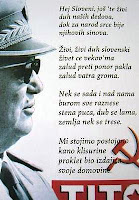The Romanian Anthem Composer and Lyricist
 During the fall of the Communist government in the last days of 1989, the popular song "Desteaptate, romane" (Wake up Romanian) was prevalent in the streets and quickly became a kind of "second anthem"; it was officially declared as the anthem in April, 1990, and was also used for a time by Moldova. Written during the 1848 revolution, it has been used by Romanians in their many struggles for freedom, such as from the Nazis in 1944, and during the end of communism, thus becoming the logical choice as a new anthem. The original work by Andrei Muresanu has eleven verses, but only four (verses 1, 2, 4, and 11) are the official lyrics. The composer was Anton Pann.
During the fall of the Communist government in the last days of 1989, the popular song "Desteaptate, romane" (Wake up Romanian) was prevalent in the streets and quickly became a kind of "second anthem"; it was officially declared as the anthem in April, 1990, and was also used for a time by Moldova. Written during the 1848 revolution, it has been used by Romanians in their many struggles for freedom, such as from the Nazis in 1944, and during the end of communism, thus becoming the logical choice as a new anthem. The original work by Andrei Muresanu has eleven verses, but only four (verses 1, 2, 4, and 11) are the official lyrics. The composer was Anton Pann.Anton Pann born Pantoleon-Petroveanu, and also mentioned as Anton Pantoleonor
 Petrovici; 1790s—November 2, 1854), was an Ottoman-born Wallachian composer, musicologist, and Romanian-language poet, also noted for his activities as a printer, translator, and schoolteacher. Pann was an influential folklorist and collector of proverbs, as well as a lexicographer and textbook author.
Petrovici; 1790s—November 2, 1854), was an Ottoman-born Wallachian composer, musicologist, and Romanian-language poet, also noted for his activities as a printer, translator, and schoolteacher. Pann was an influential folklorist and collector of proverbs, as well as a lexicographer and textbook author.Andrei Mureşianu (November 16, 1816, Bistriţa - October 12, 1863, Braşov) was a Romanian poet and revolutionary of Transylvania (then in the Habsburg Monarchy). Born to a family of peasants, he studied philosophy and theology in Blaj. Starting in 1838, Mureşianu was a professor at Braşov. He published his first poetry in the magazine Foaia pentru Minte, Inimă şi Literatură.
He was one of the figures of the 1848 revolution in Transylvania, taking part in the Braşov delegation to the Blaj Assembly in May 1848. His poem Deşteaptă-te, române!, sang to
 a popular tune chosen by him and Gheorghe Ucenescu, became the hymn of the revolutionaries. Nicolae Bălcescu named it "La Marseillaise of Romanians" for its ability to mobilize the people to fight. The poem became the national anthem of Romania in 1989. After the revolution, Mureşianu worked as a translator in Sibiu, had some patriotical works published in the Telegraful Român magazine. In 1862, his poetry was gathered in a single volume.
a popular tune chosen by him and Gheorghe Ucenescu, became the hymn of the revolutionaries. Nicolae Bălcescu named it "La Marseillaise of Romanians" for its ability to mobilize the people to fight. The poem became the national anthem of Romania in 1989. After the revolution, Mureşianu worked as a translator in Sibiu, had some patriotical works published in the Telegraful Român magazine. In 1862, his poetry was gathered in a single volume.





